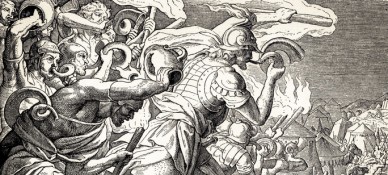What Does It Mean to Take Up Your Cross?
Written by Ken McIntosh
Many have been confused by Jesus’ instruction for a follower to “take up his cross.” A person might respond, “I don’t have a cross. How can I do that?”

Jesus gave an important and challenging instruction during His ministry on earth. While Jesus and His followers were on the road, He called His disciples and “began to teach them that the Son of Man must suffer many things, and be rejected by the elders and chief priests and scribes, and be killed, and after three days rise again” (Mark 8:31).
His disciples did not fully understand what He had told them. Not too long after He said this to them, they were actually arguing over which of them would be the greatest in the coming Kingdom! Instead of focusing on the gravity of what Jesus was facing, they were focused on their own prestige.
Jesus had to teach them that wasn’t where their focus should be.
“Take up his cross”
After telling His followers what awaited Him, Jesus gave them instruction about bearing their cross and following Him. “When He had called the people to Himself, with His disciples also, He said to them, ‘Whoever desires to come after Me, let him deny himself, and take up his cross, and follow Me’” (Mark 8:34).
In Luke 9:23 Jesus makes the same statement and adds that it is to be done daily. “Then He said to them all, ‘If anyone desires to come after Me, let him deny himself, and take up his cross daily, and follow Me.’”
Jesus’ burden
When He spoke this, His future suffering must have been weighing very heavily on His mind. And it seems none of His disciples gave Him support, comfort or compassion. He knew what his future would bring. He knew He would be arrested and beaten. He knew He would be scourged. He knew He would be crucified and killed, and He knew how terrible it would be.
After all, it was He who inspired Isaiah to prophesy about Himself: “Just as many were astonished at you, so His visage was marred more than any man, and His form more than the sons of men” (Isaiah 52:14).
He knew how bad it would be, and He dreaded it. This is why in the Garden of Gethsemane, after His last Passover meal, He prayed, “O My Father, if it is possible, let this cup pass from Me; nevertheless, not as I will, but as You will” (Matthew 26:39).
He prayed this same prayer two more times that night: “O My Father, if this cup cannot pass away from Me unless I drink it, Your will be done” (verses 42, 44).
Though He was aided in carrying it by a man named Simon of Cyrene, the horrible ordeal and crucifixion were His alone to bear. He took up His cross of suffering and willingly bore it till the end.
The challenges of the Christian life
Sometimes hard and difficult things happen in the lives of people who follow Jesus Christ. Living the Christian life is not always easy. It can also have sorrow. It can mean giving up things we have and forgoing things we desire. It can mean giving up a job or career we want even if we have planned and trained for it for years. It can mean the loss of our money and property. It can mean rejection by family (Luke 12:53).
Over the centuries, many Christians have faced various forms of persecution because they stayed true and faithful to God. But those who have remained faithful all took up their cross and endured whatever they faced.
Example: the rich young ruler
An example of this requirement that we endure and make whatever sacrifices we must to follow the Christian life occurred on Jesus’ final trip to Jerusalem.
“Now as He was going out on the road, one came running, knelt before Him, and asked Him, ‘Good Teacher, what shall I do that I may inherit eternal life?’
“So Jesus said to him, ‘Why do you call Me good? No one is good but One, that is, God. You know the commandments: “Do not commit adultery,” “Do not murder,” “Do not steal,” “Do not bear false witness,” “Do not defraud,” “Honor your father and your mother.”’
“And he answered and said to Him, ‘Teacher, all these things I have kept from my youth.’
“Then Jesus, looking at him, loved him, and said to him, ‘One thing you lack: Go your way, sell whatever you have and give to the poor, and you will have treasure in heaven; and come, take up the cross, and follow Me.’
“But he was sad at this word, and went away sorrowful, for he had great possessions” (Mark 10:17-22).
The man wanted to inherit eternal life but could not bear the thought of parting with his wealth and possessions. He was willing to keep the commandments as he understood them, but he was not willing to sacrifice his stuff. He would not take up his cross.
His example teaches us that nothing in our lives should be more important than our relationship with God.
In the end, great blessings
As Christians, we know that God is fair and a rewarder of those who diligently seek Him. He will reward His people who suffer for His sake in this life.
“And everyone who has left houses or brothers or sisters or father or mother or wife or children or lands, for My name’s sake, shall receive a hundredfold, and inherit eternal life” (Matthew 19:29).
Living the Christian life regardless of the difficulties
Many have not had all these bad things happen in their lives, but the potential is there. If necessary, we must endure them, both in good times and in bad times. Bearing our cross is living the Christian life regardless of the difficulties that come our way.
Our Christianity is to be the most important thing in our lives. It is more important, more precious, than our career or our wealth. It means more to us than our family. Nothing can be more important.
As we read in Luke 9:23, we are told to take up our cross daily. This means that we are to live the Christian life every day of our life. We don’t take days off from it. We can’t take a vacation from Christianity. We live this way every day regardless of the circumstances.
When Jesus told His followers to take up their cross and follow Him, He was telling them to be true and faithful in their Christian lives regardless of the circumstances.
We must be prepared to do that!










